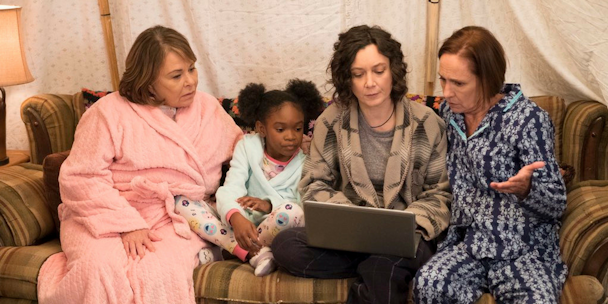Has the 'Barr' just been raised in brand safety?
The first half of 2018 has driven the concept of brand safety to become a top of mind issue for brands, agencies and digital marketers.

Jesse Nicely of Cashmere Agency opines the real impact Roseanne's cancellation: how celebrity impacts television's brand safety / ABC via Twitter
In the wake of last week’s Roseanne incident, we can see how what started as an easy to grasp concept around keeping a brand's reputation safe when they advertise online has quickly become a conversation that encompasses an increasingly complex set of considerations.
Brand safety makes good business sense on the surface. What brand wants to see their ads running next to racist and offensive content? Or in the case of Roseanne, associated with talent that makes racist and offensive comments on their own social media?
In the current celebrity-driven, 24/7 social media environment, it appears that the question for brands to consider is this: how much risk is your brand willing to tolerate in being associated with talent that could easily veer into controversial territory? Especially when it’s been historically shown that just the right amount of controversy can be good for business.
Take Spotify for example. Just last week, after they attempted to initiate an Artist Behavior Policy, starting with removing R. Kelly from their curated playlists in response to the #MuteRKelly boycott, streams of Kelly’s music actually increased on the platform.
Spotify went on to receive backlash from numerous artists that quickly pointed out the hypocrisy of the policy, and the slippery slope of a platform like Spotify getting involved in the business of trying to morally police artists. While they still will maintain their policy against any artist or podcast that engages in hate speech on their platform, when it comes to censoring which artist should appear on their highly influential curated playlists, Spotify capitulated to the pressure, stating in a press release that: "Across all genres, our role is not to regulate artists... Therefore, we are moving away from implementing a policy around artist conduct."
Imagine for a moment if that same quote had come from ABC. Highly doubtful, likely owing in part to audiences and advertisers viewing a platform like Spotify as agnostic when it comes to the content distributed on their service. Since they’re not actually involved in producing the music, why get involved? At this point, they've become somewhat of kingmaker owing to their reach. Clearly, the waters are becoming more difficult to navigate as to who we can and can’t hold accountable when it comes to brand safety.
In the case of Roseanne, since a major broadcast network (owned by Disney) is actively involved in funding and producing the content they distribute, we can see how when it came to the racist (and supposedly Ambien induced?) comments made by Roseanne, ABC had no choice but to take action. What we saw was a case study worthy response as network President Channing Dungey took action so swiftly, that by noon the headlines focused on Roseanne getting fired and her show getting canceled. Within less than 12 hours the focus of the story shifted from Barr’s incendiary tweet to the the network's response.
While some industry headlines cited brand safety, if this were really about brand safety, why did Disney-ABC decide take the risk of getting back into business with Roseanne Barr in the first place? When you’re dealing with a celebrity with a track record of instability, bizarre and offensive statements, and jokes in poor taste (you can check the track record here), you don’t have to be a Vegas oddsmaker to recognize there was a high probability of Roseanne saying something wildly offensively.
She has, after all, made her career pushing the envelope as a comedian. Yet marketers and brands are always eager to connect with lucrative demographics -- and networks are in the business of serving up those audiences to advertisers. The network and advertisers decided to look the other way until they were forced to confront the issue head on.
There are plenty of brands that aren’t overly focused on the moral fabric of the content they’re aligning with for marketing purposes. They’re more focused on the audiences consuming that content, their disposable household income, and how to sell products to that engaged audience. On paper, a Roseanne reboot during a Trump Presidency represented a smart shrewd business move. It allowed the network to reach that same large portion of the electorate that Trump had so effectively resonated with, delivering the network’s biggest ratings in two decades.
Will the lesson here be that networks should shy away from controversial personalities because the risk is too great? Not likely. The lesson here is that brand safety is relative to the amount of media scrutiny your brand and industry are under at the moment. A nice concept to believe in, but in reality plenty of brands and marketers seem content practicing a game of situational ethics.
Let’s not cling to this as an example of brand safety after the damage has been done. As marketers, if we’re really practicing brand safety, it starts by being honest about who or what we're placing our brands adjacent to from the very beginning. It could be argued that what we saw unfold with Dungey’s firing of Roseanne was less about “brand safety” and more of a master class in PR, risk management and damage control.
In this case, one question that still remains: if there had been more rigorous measures of brand safety, would they have really taken the risk of putting Roseanne back on the air to begin with?
Jesse Nicely is the director of creative strategy at Cashmere Agency.
